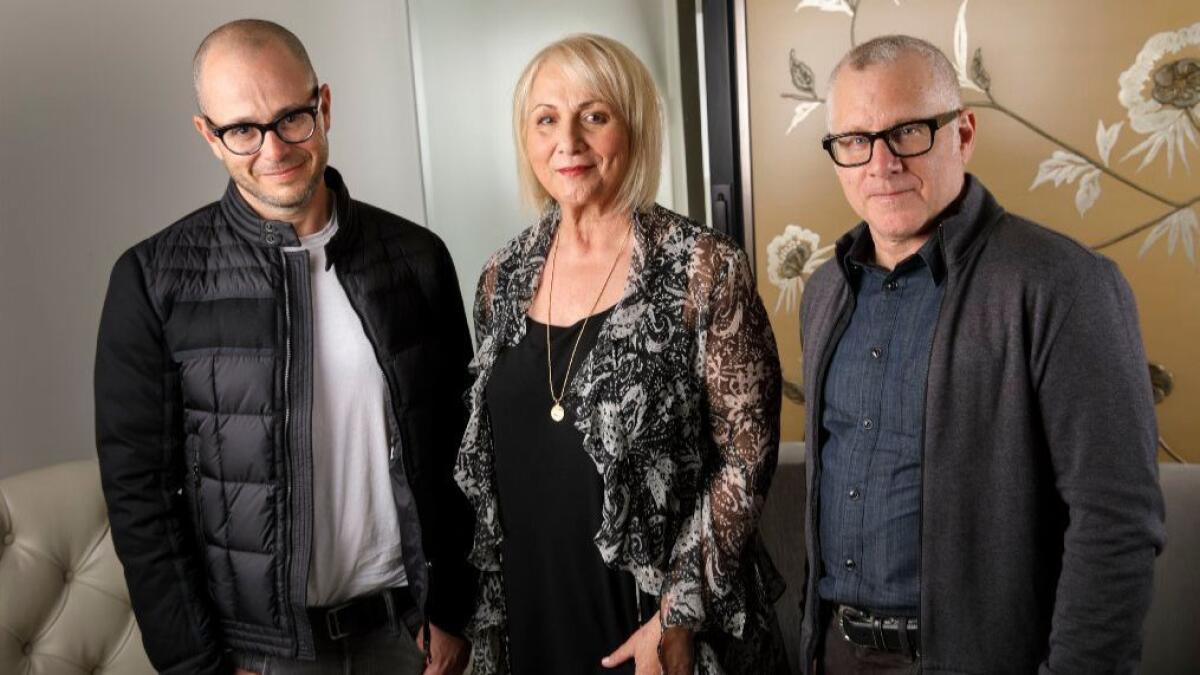In just three seasons, ‘The Leftovers’ became challenging, engrossing TV that had to be watched

- Share via
Damon Lindelof was in an airport – we’ll assume the Departures area – when a book review grabbed his attention: a new work by a favorite author, Tom Perrotta (“Little Children”), reviewed by Stephen King (another favorite), citing “The Leftovers” as the best “Twilight Zone” episode never made. “King! ‘Twilight Zone’! Perrotta! Multiple sparks,” recalls Lindelof. “I immediately walked into a bookstore and read it on the plane.”
It had been a year since Lindelof had brought the acclaimed “Lost” — “six years of my life working 90 hours a week” — to a divisive close. He thought he’d never want to do television again. “In the space of those seven hours, it was ‘Oh, I want to do this.’”
From “Lost” to found, and again with a mysterious event — this time, the sudden vanishing of 2% of the world’s population, and its lingering effect on a handful of churning souls: the questioning, the bereft, the deadened and the raging. Families struggled; cults formed; life went on, and sometimes that seemed impossible to accept. There would be no explanation for the Departure, just an empathetic microscope on the survivors.
The result became, in only three seasons, a haunted, liberating, sometimes frustrating, always analyzed, and in-the-end burnished gem for HBO. It was difficult viewing that you had to watch, because inside it was unexpected humor (eventually), surreality (the beloved “International Assassin” episode), and some amazing grace.
See the most read stories this hour »
Soon, the show’s strengths revealed themselves. Episodes focusing on one character, telling a contained story that illuminated the larger narrative, ignited one key fuse. Also, once Perrotta’s source material had been exhausted after the first season, new locations were sought — a Texas town where nobody vanished, Australia this final season. Characters were added, and a few made jarring reappearances. It kept writers on their toes. Says Lindelof, “The show is trying to replicate an energy of discomfort, not feeling at home, of never feeling like [you’re] on terra firma.”
In year one, it was worry about what the white-clad, silent, chain-smoking Guilty Remnant cult might do to disrupt others’ lives. In Texas, earthquakes did the unsettling, and this season, it was fear the world might end. Lindelof cites “The Wire” as an inspiration. “Every season, they moved the focus of the show,” says Lindelof. “I thought that would be an exciting thing to experiment with.”
At heart, viewers took to the richly drawn characters and their often-quixotic quests for answers. Carrie Coon’s Nora, who lost the most on the day of the Departure, mixed heroic resilience with aching pockets of vulnerability. Justin Theroux’s Kevin, perilously drawn to death and renewal, became an unwitting Messiah for the likes of faith-driven — and faith-tested — preacher Matt (Christopher Eccleston). Kevin’s ex-wife Laurie (Amy Brenneman) went from stricken cultist to spreader of compassion.
Though they were the series’ most controversial element, the buzz-kill-minded Guilty Remnant made sense to Lindelof as a form of protest. “It felt completely on par with a bona fide psychological reaction to an event that made no sense. They don’t speak because they don’t know what to say.” He draws attention to today’s political climate, and liberal fears of normalizing the abnormal. “Whatever your affiliation is, there’s an ideology now that’s ‘Shouldn’t I be out in the streets screaming at the top of my head about everything?’ The Guilty Remnant was basically like those people, saying ‘140 million people disappeared, and you people act like it never happened.’”
What will the legacy of “The Leftovers” be? Lindelof is expectedly cagey about next week’s finale, but he stresses it isn’t designed to be all anyone talks about. “There are shows you reflect back on because of what the show was, and there are shows where you reflect back on the show because of what the finale was. My hope is people are talking about the series and not the finale. We know how to make this show feel, and we’re not out to shock anybody. It’s not chasing big story energy. It’s chasing big, intense emotional energy.”
Considering the hard-won acceptance some of its characters have already experienced, Lindelof thanks fans for sticking with a show built to be turbulent. “I know it wasn’t always easy,” he says, “but as all faith-based exercises reveal themselves to be, sometimes it’s more rewarding for having gone through a bit of suffering.”
More to Read
From the Oscars to the Emmys.
Get the Envelope newsletter for exclusive awards season coverage, behind-the-scenes stories from the Envelope podcast and columnist Glenn Whipp’s must-read analysis.
You may occasionally receive promotional content from the Los Angeles Times.










